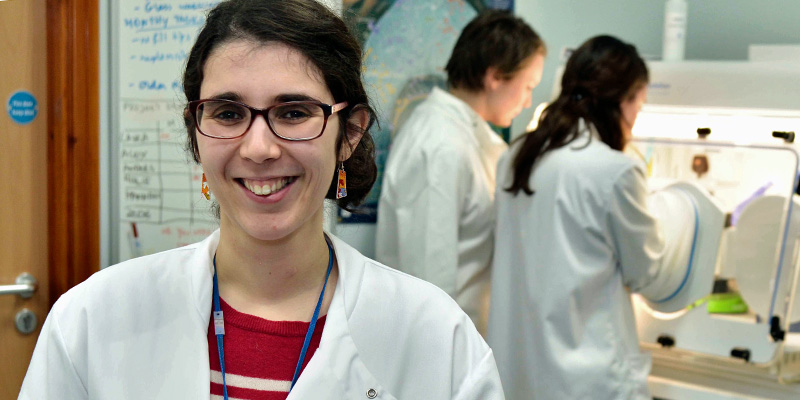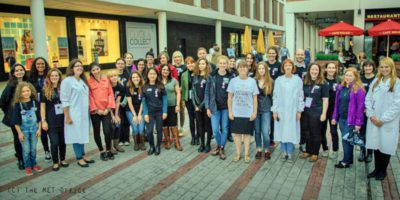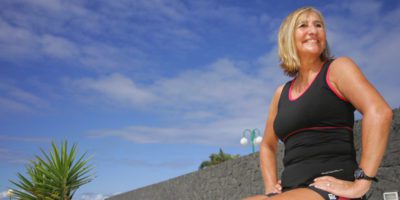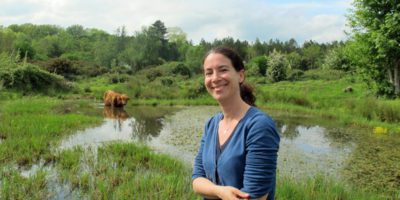Dr. Isabel Pires is a lecturer in Biomedical Science at the University of Hull. She studied in Portugal before moving to the UK to do her Ph.D. at the University of Manchester, and then joining the University of Oxford as postdoctoral researcher. Isabel is a Soapbox Science veteran, having spoken at and organised previous events.
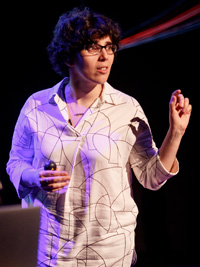
Isabel is organising the Hull Soapbox Science event, which takes place on Saturday 1st July 2017 at 2pm at St Stephen’s Shopping Centre.
Pursuing a career in biomedical science to take on cancer
I am what it is called a ‘basic biologist’. That is, I am interested in a particular aspect of human biology, in this case the molecular and cellular aspect of cancer. My interest in cancer started as an undergraduate student, when I got really interested in how cancer occurs when normal cellular biology goes wrong, and what causes those changes.
Unlike many of my colleagues, my interest in cancer research started from my scientific curiosity regarding a complex disease (or more correctly, group of diseases). I found it fascinating how cellular changes, such as the changes that occur in wound healing, or to allow tissue survival after a heart attack, could be hijacked by the tumour cells to allow the cancer to grow and spread.
However, working in research institutions next to cancer hospitals and interacting with patients really brought home the massive significance of the work we do, and that motivated me to continue in the field.
I did my first placement in cancer research when I came to Manchester to do my undergraduate project. The experience of that nine month placement in the lab of Dr. David Hughes crystallised my desire to pursue a research career in cancer biology, which led to joining Professor Caroline Dive’s lab as a Ph.D. student.
Those formative years in both the University of Manchester and the Manchester CRUK Cancer Research Institute (formerly the Paterson Institute), allowed me to grow as a scientist. Working next door to Christies Cancer hospital really brought home the importance of the work we do, and helped us persevere through the harder days in the lab. I participated in open days and visitor days as often as possible, and interacting with patients and their families was, and continues to be, a humbling experience.
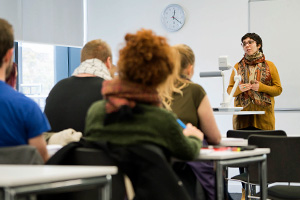
After my Ph.D., I moved to the lovely city of the dreaming spires, Oxford, to join Dr. Ester Hammond’s lab, where I got a taste for studying a particular aspect of tumour biology, regions of low oxygen in tumours. It was a very productive time and a fantastic experience in an amazing group, and was the perfect stepping stone for setting up my own lab here in Hull.
My role as a lecturer
My job is a mix of many skills. My primary role as a lecturer involves both teaching and research, but I also do a lot of public engagement too. Being a lecturer also involves a lot of meetings..!
The teaching role involves planning and delivering lectures, tutorials, and practical sessions, as well as doing all the assessment that goes with it. I also have both undergraduate and M.Sc. students in the lab every year that I train and supervise. I am also the programme director for the M.Sc. in Translational Oncology, which involves further administration, participating in the admissions process, and coordinating how the modules are run to make sure all goes smoothly.
My research responsibilities involve managing my lab team, training the Ph.D. students, designing and implementing research programmes, applying for and securing funding, preparing and submitting papers, managing budgets etc. I even get to play in the lab every now and then.
I am also involved in committees (which means a lot of meetings…), both at department and university level, as well as externally for organisations such as the British Association for Cancer Research and the Biochemical Society. I also participate in recruitment events, for example through open days.
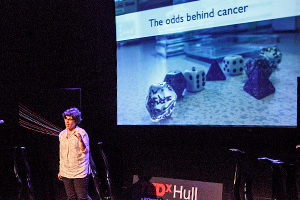
Last but not least, I am also very active in public engagement and science communication, and, as well as organising Soapbox Science Hull, I give talks such as TEDx Hull and Pint of Science, and co-organise the local Café Scientifique.
Academic life is definitively varied and keeps me busy!
Culture buzz
We are contributing to the amazing culture buzz in Hull this year. As the events are mostly arts-focused, it is valuable to also engage in scientific debate and dialogue. I believe scientific knowledge is part of a rounded cultural experience, and we hope the public will enjoy, and be stimulated and challenged by, our speakers. It is a fantastic time to be in Hull, and we’re hoping to build on this legacy by continuing Soapbox Science for years to come.
This year, as in 2016, we have a very exciting line-up of talented female scientists to talk about a varied array of topics. They will be tackling such varied subjects as living fossils (Dr. Africa Gomez), hydrogen as fuel of the future (Jeni Spragg), nanoparticles (Charlotte Eling), a new look at human anatomy (Dr. Kat Sanders) and cancer vaccines (Dr. Barbara Guinn).
We are organising a speakers’ training session in early June (in which they will get to actually stand on their soapboxes), as well as having individual one-to-ones with the speakers to discuss their ideas on how to prep their talks.
Importance of science communication in a ‘fake-news’ world
As scientists, we have a responsibility to communicate our science clearly and accessibly, in order for the general public to engage with it. It is fascinating and challenging trying to convey complex topics like this. Also, sometimes, from chatting to the public about our science we can come up with new ways of looking at it, and perhaps gain new ideas about how to develop it.
By engaging the public, we are demystifying science, and perhaps inspiring them to look further into a specific topic, or even to become scientists themselves. But more importantly, the scientific way of thinking, to its core critical and analytical, empowers individuals to think critically themselves, which, in this day of ‘fake-news’, loss of respect for experts, and science misinformation, it is more important than ever.
Cancer researchers working collaboratively across borders and continents
Cancer research is certainly a multination effort, with groups all over the world focused on understanding the biology of cancer, how to detect it early, and how to treat it more effectively and more specifically. However, cancer it is not one disease but many diseases with similar characteristics, and a single treatment strategy is not feasible.
As technology advances, the aim is to develop patient-focused therapy strategies. This not only means defining specific ways to treat a specific patient’s cancer, but also to understand its biology, to be a step ahead of phenomena such as therapy resistance, cancer spread, and so on. But ultimately, we would like to reduce preventable cancers, such as those caused by lifestyle choices such as smoking. In order to do that it is imperative to inform and engage the public, so they can make fully informed choices.
Coming up next in the City of Culture
In my research, I am currently finalising some changes to a paper we are hoping to resubmit soon, and preparing a couple of grant applications to continue and expand on some work in the lab. It is also the start of marking season, which that is taking quite a bit of my time!
There have been quite a few changes to the University over the last few years, both as an organisation and in terms of infrastructure, and we are starting to see some of the benefits from these. In my faculty (Health Sciences) we are especially looking forward to the opening of the new state of the art Medical Building, on the new Health Campus.
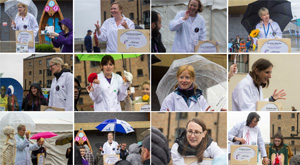
The University has a great buzz at the moment! As one of the principal sponsors of City of Culture 2017, we have had quite a few events and art exhibitions on campus, which is fantastic! I am an absolute fan of the National Portrait Gallery, so it’s wonderful to see a collection of their commissioned portraits here in the library.
In the same space, earlier this year we, had a fantastic exhibition of line drawings from the National Gallery. And currently scattered throughout campus there are some striking statues from Icelandic artist, Steinunn Thórarinsdóttir, celebrating the 1000-year-old link between Hull and Iceland. We also have regular talks, film screenings, and music events, so pretty exciting really! And, of course, there is Soapbox Science Hull 2017!
http://www2.hull.ac.uk/science/bbes/our%20staff/academic%20staff/isabel%20pires.aspx
http://soapboxscience.org/soapbox-science-2017-hull
https://twitter.com/SoapboxHull
Main image credit: © Mike Parks

